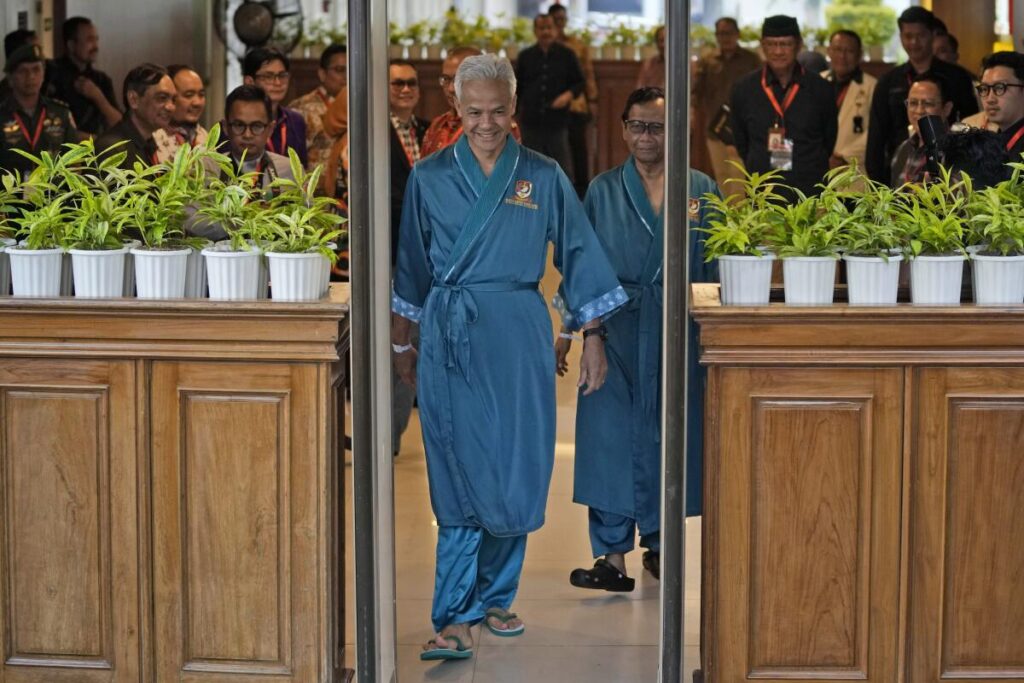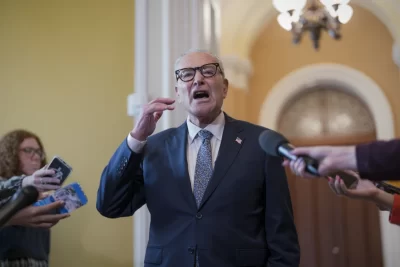
Indonesia’s leading presidential hopeful named outgoing President Joko Widodo’s eldest son as his running mate in next year’s election in Southeast Asia’s largest democracy.
The announcement late Sunday by Prabowo Subianto — a former special forces general who currently serves as defense minister — that he had chosen Gibran Rakabuming Raka as his vice-presidential candidate ended weeks of fevered speculation in the Indonesian media.
Gibran, 36, serves as mayor of Surakarta, Widodo’s hometown in Central Java province. He does not meet the age requirement to run of 40 but the country’s Constitutional Court — headed by the president’s brother-in-law — made an exception in a ruling last week. It now allows those who served or had been elected as regional leaders to run at a younger age.
The controversial ruling, which clears the way for Gibran to run in the election, has been widely criticized as nepotistic, with analysts warning it could undermine the democratic process.
Subianto, who is also the Gerindra Party chairman, announced his pick late Sunday after meeting with eight leaders of his party at his residence in southern Jakarta. The February election will determine who will succeed Widodo, who is serving his second and final term.
Gibran, who is still a member of the Indonesian Democratic Party of Struggle, or PDIP, did not appear during the announcement, but personally met with the leaders of the Gerindra Party on Saturday. PDIP has nominated former Central Java Gov. Ganjar Pranowo as its presidential hopeful.
The election is shaping up as a three-way race between Subianto and two former governors, Anies Baswedan and Ganjar Pranowo.
Baswedan, a former governor of Jakarta, chose as his running mate Muhaimin Iskandar, the chairman of the National Awakening Party, which has strong ties to the country’s largest Islamic organization, Nahdlatul Ulama, which boasts over 45 million members.
Pranowo picked Muhammad Mahfud, the minister of the Coordinating Politic, Law and Security as his running mate. Mahfud is known as a frank and outspoken figure.
Recent opinion surveys show Subianto maintaining a large lead over the rival camps.
Four nationwide surveys conducted in the second half of September show Subianto between 11 and 20 percentage points ahead of both Baswedan and Pranowo, though undecided voters are as high as 20%
Next year’s election is Subianto’s third bid for the presidency following his losses to Widodo in the 2014 and 2019 elections, respectively.
Subianto, an elite figure linked to human rights abuses during the Suharto dictatorship, is a powerful speaker. His ultra-nationalistic campaign has focused on what he sees as Indonesia’s weakness in the world relative to its vast land area rich in natural resources and population of more than 270 million.
Widodo’s trust rating remains very high and Subianto needs his full support “because the 2024 election is his last chance to be in power,” said Dominique Nicky Fahrizal, a researcher at the Centre for Strategic and International Studies.“This is his only momentum.”
He added that naming Gibran as his running mate and pledging to continue Widodo’s agenda are parts of his efforts to win Widodo’s sympathy and support.
Recent reports by Kompas, Indonesia’s reputable pollster, indicate Widodo is hugely popular in the archipelago nation with an over 70% public trust rating.
His supporters argue it is necessary to give Widodo more time to deal with the recovery of the economy that slumped during the two-year pandemic, and complete his agenda, including the $35 billion capital relocation project to the island of Borneo.
Despite his ineligibility to run again after two terms in office, doubts about Widodo’s intentions have persisted.
“Jokowi needs a scenario to continue what has been planned by his administration,” Fahrizal said, referring to Widodo’s popular nickname. “He wants his successor to be someone he chooses.”
Indonesia is set to vote in simultaneous legislative and presidential elections on Feb. 14 next year. The country has had free and largely peaceful elections since the Suharto’s fall in 1998.




